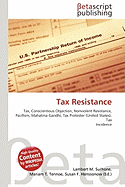In early 2003 when the U.S. was being railroaded into fighting another war in Iraq, I was seriously looking at how I might protest this war. I did not agree with the war, because it was a distraction from the real problem (Al Qaeda) and didn't have good, to my eyes, justification. Since it was also tax season that's where my thoughts went. Could I protest the war by withdrawing my monetary support for the government? Could I become a tax resister, by engaging in tax resistance to protest the war?
Going to the local bookstore I did find a few books on the subject, and brought one home.
War Tax Resistance: A Guide to Withholding Your Support from the Military
War Tax Resistance: A Guide to Withholding Your Support from the Military
This book gives a very good history of tax protests over various taxes, and the legal successes and nightmares of those who attempted to do so. It sure gave me pause for reflection about the legitimacy of war tax protesting, the utility of doing so, and gave me a different route to my war protest.
First, you will run afoul of U.S. law if you neglect to pay your taxes. Consider the actual action you will have to take. If you simply do not pay your taxes, how is this to be an effective protest? Isn't effective protest when it draws peoples attention? The act of not paying your taxes isn't very visible, unless you make a big splash of it. But the more of a splash you make, the more likely you will gain the attention of law officials who will arrest and prosecute you for failure to pay taxes. Speaking for myself, my purpose does not involve being in jail.
There might be a moral high ground to take to refuse to pay taxes to support a war you find disagreeable, but if the result is jail time and nobody knowing you've taken your stand or the cost you're paying, then what's the use of taking the stand? Aren't there more effective ways to protest stupid illegal wars?
The next point of consideration is, what are taxes about? What's the purpose of taxes? For me taxes do lots more than fund the military. I wouldn't be doing this as an excuse to not pay taxes. The purpose would have been to protest the war. I agree with most of the functions of government. In agreeing with the functions of government, should I not also pay for them? Hence, should I agree to being taxed? Well, yes. Taxation is a common and relatively effective way to pay for government.
The book does cover this distinction. Many war tax protesters calculate how much of their taxes go to supporting war, and deduct that portion from their taxes. They still end up liable for paying the taxes, and there is still the question of whether it's an effective protest. The protest act of not paying taxes is private between non-tax-payer and the IRS, unless they make it public.
What I chose, in the end, is more direct. I participated in peace marches, and I began writing this web site.
I also increased my charitable donation schedule. The reasoning is that I would rather directly determine what my money is going to support, over giving it to the government, and charitable donations are a way to do this. Giving money to charity withholds it from the government, funneling it to causes I care about. Unfortunately this is an inefficient route because only around 30% (depending on your tax rate) of the money you donate to charity is returned to you in tax reduction. To totally erase your tax bill through charitable donation would bankrupt anybody.
Other resources
War Tax Resisters Penalty Fund: [http://www.nonviolence.org/issues/wtrpf/] War tax resisters in the United States have a long history of witness against war. Just as conscientious objectors have resisted military service, war tax resisters have refused to pay for war as far back as colonial times. Henry David Thoreau spent a night in jail for refusing to pay taxes for the Mexican-American War. More recently, thousands of American taxpayers have refused to pay part or all of their income taxes to protest the military priorities of our government.
 Tax Resistance: Whiskey Rebellion, Rate-Capping Rebellion, Tax Protester Statutory Arguments, Tax Protester Constitutional Arguments: Chapters: Whiskey Rebellion, Rate-capping rebellion, Tax protester statutory arguments, Tea Party movement, Tax protester constitutional arguments, History of tax resistance, Tax avoidance and tax evasion, Edward and Elaine Brown, Tax protester history, Farmers' movements in India, Bath School disaster, Salt Satyagraha, Boston Tea Party, Render unto Caesar..., Tax protester Sixteenth Amendment arguments, 1669 Jat uprising, Sricity, War of the Regulation, We the People Foundation
Tax Resistance: Whiskey Rebellion, Rate-Capping Rebellion, Tax Protester Statutory Arguments, Tax Protester Constitutional Arguments: Chapters: Whiskey Rebellion, Rate-capping rebellion, Tax protester statutory arguments, Tea Party movement, Tax protester constitutional arguments, History of tax resistance, Tax avoidance and tax evasion, Edward and Elaine Brown, Tax protester history, Farmers' movements in India, Bath School disaster, Salt Satyagraha, Boston Tea Party, Render unto Caesar..., Tax protester Sixteenth Amendment arguments, 1669 Jat uprising, Sricity, War of the Regulation, We the People Foundation
 Tax Resistance: High Quality Content by WIKIPEDIA articles! Tax resistance is the refusal to willingly pay a tax because of opposition to the institution that is imposing the tax, or to some of that institution's policies. Tax resistance can be a form of conscientious objection (for example, some pacifists refuse to pay taxes that pay for war). Tax resistance can also be a variety of protest, or a technique of nonviolent resistance (for example, in India's campaign for independence led by Mahatma Gandhi)
Tax Resistance: High Quality Content by WIKIPEDIA articles! Tax resistance is the refusal to willingly pay a tax because of opposition to the institution that is imposing the tax, or to some of that institution's policies. Tax resistance can be a form of conscientious objection (for example, some pacifists refuse to pay taxes that pay for war). Tax resistance can also be a variety of protest, or a technique of nonviolent resistance (for example, in India's campaign for independence led by Mahatma Gandhi)
 American Quaker War Tax Resistance --and-- American Quaker War Tax Resistance
American Quaker War Tax Resistance --and-- American Quaker War Tax Resistance

No comments:
Post a Comment